After the fall of the Berlin Wall in 1989, Clifford Geertz predicted that the world would be characterized by ‘deep diversity’, ‘a sense of dispersion, of particularity, of complexity and of uncenteredness’ rather than unified world order, as stipulated by the then consensus.
In an age of identity politics and culture wars, Geertz’s insights sound even more powerful today than they did at the time. According to the American anthropologist, our task is ‘to penetrate the dazzle of the new heterogeneity’ and analyse the paradox that confronts us: the world is both more global and more divided than ever in human history. The sense that we find ourselves in ‘a scramble of differences in a field of connection’ is even more immediate, as is the realization that there is a multiplicity of alternative, sometimes conflicting and clashing, visions of the good.
This focal point, inspired by a lecture that Geertz delivered in 1995 at the Institute for Human Sciences in Vienna, summarized in the institute’s magazine, will engage with these issues. It follows the launch of a research programme of the same name at the institute in January 2023, coordinated by Clemena Antonova.
The collection of essays is an extension of earlier focal points ‘Eurasia in Global Dialogue’ (2018-2023, led by Clemena Antonova) and ‘Russia in Global Dialogue’ (2012-2018, led by Tatiana Zhurzhenko). Further texts have been contributed by journals in the Eurozine network.

In collaboration with
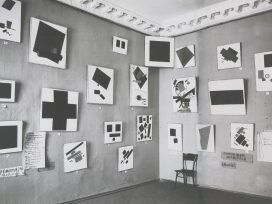
How modernity invented tradition
The self-presentation of the Russian avant-garde
The ‘discovery’ of Medieval icons after a 1913 exhibition marks a shift in the Russian avant-garde’s self-image. From now on, the path of western modernism would be abandoned in favour of a distinctively ‘Russian’ art. But in inventing a tradition for themselves, avant-gardists ‘rediscovered’ a sensibility that didn’t need unearthing.
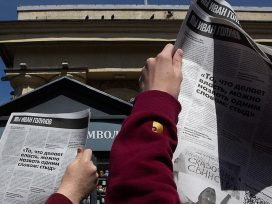
Free expression on the margins
The Kremlin and the media
On coming to power, Vladimir Putin set about restricting the freedoms that Russian media enjoyed under Yeltsin. After the protests of 2011–12, even the smaller-audience media that still pursued editorial independence came under pressure. Recently, a rise in civic activism and the rapid expansion of internet technologies have brought a new vibrancy – although non-government media remain powerless before the Kremlin’s political monopoly.
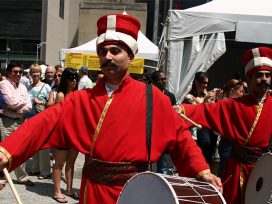
Both Russia and Turkey are ethnically diverse former empires that underwent similar processes of modernization and had similar relationships with the West. Today, they have revived a civilizational paradigm with a strong authoritarian and anti-western character. Precisely this resemblance is resurrecting rivalry for power and influence in the region.
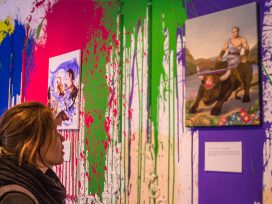
Many Russians were happy to exchange the freedoms of the 1990s for a stream of oil money and a concept of ‘order’ guaranteed by a paternalistic leader. Putin’s popularity may be wavering, but the demands he caters to are stronger than ever.
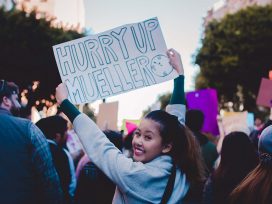
Accusations of Russian interference have become the primary route through which to undermine Donald Trump. In order to sustain public outrage, media and political elites provide a constant flow of leaks, rumours and conspiracy theories. Failing liberal self-confidence is to blame for the return of Cold War rhetoric, argues Andrei P. Tsygankov.
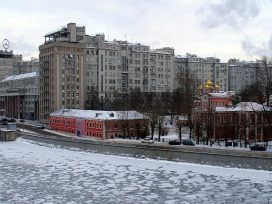
Socialism in one apartment complex
Historian Yuri Slezkine in conversation with ‘Rīgas Laiks’ editor Uldis Tirons
Moscow’s House on the Embankment was home to many of the first generation of Russian revolutionaries. Historian Yuri Slezkine, who has written the definitive account of the building, describes how it embodied the lives, hopes and fate of the Soviet project and its elite.
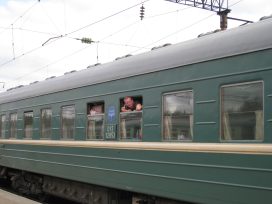
A 30-hour train journey from Vienna to Moscow offers the chance to connect with the Russian past: contraband, bribery and all. Alexei Korolyov returns to the place of his birth.
Stalin’s continuing, disputed legacy
Surveying Russia’s geography of difficult pasts
The memory of Stalin’s Terror is now receiving more attention in Russia than at any time since the 1980s. However, the scope of the debate needs to be widened still further, argues Daria Khlevnyuk.
Oleg Sentsov’s hunger strike has reached a critical stage. Sentsov is calling for the release of all Ukrainians imprisoned in Russia on political grounds. The human rights initiative OVD-Info, in collaboration with the Memorial Centre, has compiled documentation on the 88 prisoners, most of whom are from Crimea.
Mapping the road to unfreedom
Timothy Snyder’s ‘The Road to Unfreedom’ critiqued and explored
In ‘The Road to Unfreedom’, historian Timothy Snyder traces the intellectual roots of modern authoritarianism in Russia and how its influence has spread, not least in the West. In the following exchange, three east-central European scholars, brought together by ‘Razpotja’, critique Snyder’s new book – and Snyder responds.
Der russische Philosoph Iwan Iljin starb 1954 vergessen im Schweizer Exil. Seine Wiederentdeckung verdankt er Putins Regime. Es stützt sich auf ihn als Vordenker einer Politik, die die westlichen Werte im Namen eines neuen Autoritarismus systematisch untergräbt, mit Erfolg. Man könnte, meint Timothy Snyder, in Iljin den Propheten unseres Zeitalters sehen.
During the Crimea crisis, Ukrainian filmmaker, writer and Maidan activist Oleg Sentsov took part in distributing food to Ukrainian soldiers blockaded by Russian troops. He was arrested in Crimea in May 2014 and taken to Russia, where he was sentenced in 2015 to twenty years in prison on terrorism charges. In a short biographical piece, published in German translation in ‘Transit’ and republished here, Sentsov recalls his first exposure to official corruption during his schooldays. Sentsov has been on hunger strike since 14 May to campaign for the release of the approximately 70 Ukrainian political prisoners held on the territory of the Russian Federation.
In 2008, Belgian journal ‘La Revue Nouvelle’ published an interview with Arkady Babchenko, in which he explained why his experience of serving in the Russian army in Chechnya had motivated him to become a war reporter. In light of Babchenko’s recent staged murder, in order to foil a genuine assassination plot, the interview makes for chilling reading.
Franco Moretti’s seminal collection ‘Distant Reading’ set out his famous quantitative approach to literary criticism and was a key contribution to the emergent field of digital humanities. Moretti’s interest in the ‘big questions’ of literary evolution, literary form and narrative universals was shared and significantly influenced by early twentieth-century Russian Formalism, writes Jessica Merrill.
Having turned the law into an instrument of state policy and private vendetta, and having turned the legislature into a caricature without power or independence, can Vladimir Putin afford to become an ex-president? As the Russian leader prepares to be re-anointed in an election on 18 March, Mark Galeotti explores Putin’s options.







